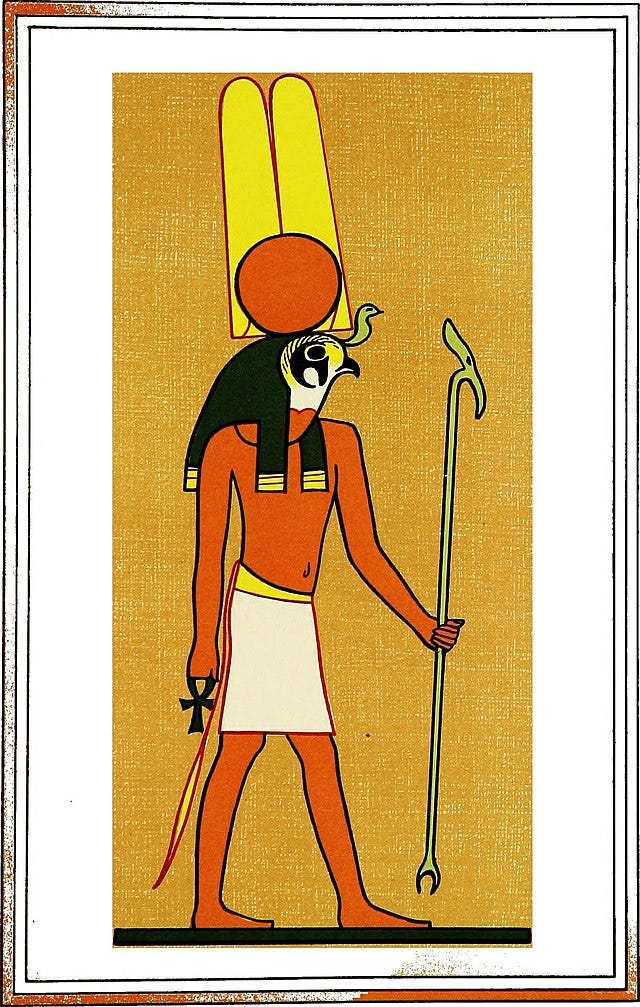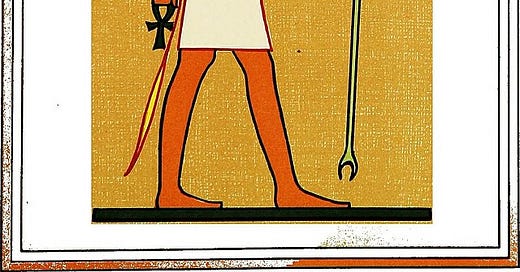The Mysterious God Nemty: Secrets From the Ancient Egyptian Worship
The worship of Nemty in Egyptian mythology holds a fascinating place in the ancient religious practices of Upper Egypt. As a god whose cult centered around the city of Antaeopolis, Nemty's significance can be traced back to the early predynastic period, specifically the 2nd dynasty. Even in these ancient times, there were already dedicated priests who served the cult of Nemty, showcasing the longevity and importance of his worship.
The exact nature and original function of Nemty remain somewhat elusive due to the limited surviving information. However, it is believed that Nemty initially held a position of patronage over the area surrounding Badari, which served as the focal point for the cult of Horus. Some theories propose that Nemty might have been a title or epithet of Horus, representing a specific aspect or function associated with the falcon deity.

Over time, Nemty's role underwent a transformation, and he became primarily known as the god of ferrymen. This shift in his association can be observed in his depictions, where he is often portrayed as a falcon standing on a boat. This imagery serves as a clear reference to Horus, who was originally depicted as a falcon and held strong associations with travel and journeying. The title "Nemty" itself translates to "(one who) travels," solidifying his connection to ferrying and movement.
As the god of ferrymen, Nemty played a crucial role in facilitating the transportation of individuals across bodies of water. This role was of particular importance in ancient Egypt, where the Nile River was a vital lifeline and means of transportation. Nemty's presence ensured safe passage and facilitated the movement of people, emphasizing his significance in the daily lives of the ancient Egyptians.
The cult of Nemty flourished in Antaeopolis, but it also extended to Per-Nemty, located in the 12th Upper Egyptian nome. These centers of worship provided dedicated spaces for rituals, ceremonies, and offerings to honor and appease the god. The people of Upper Egypt held Nemty in high regard, recognizing the importance of his divine influence in their lives.
One notable appearance of Nemty in Egyptian mythology can be found in the tale known as "The Contendings of Horus and Seth." This narrative recounts the struggle for power and the settlement of Osiris' inheritance, serving as a metaphor for the conquest of Lower Egypt by Upper Egypt. In this story, Seth, the patron of Upper Egypt, gathers the gods to present his arguments and gain support.
To prevent any interference from Isis, Horus' wife and a powerful deity in her own right, Seth instructs Nemty to deny passage to anyone resembling Isis. However, Isis cleverly disguises herself as an old woman and manages to convince Nemty to ferry her across the water, resulting in the disruption of the council through her magical intervention.
Nemty's unintended betrayal leads to severe consequences, with his toes being cut off as punishment. This punishment renders him unable to perch and reside on the boat, altering his role as the god of ferrymen.
The significance of Nemty is further emphasized by his inclusion in the names of two pharaohs during the Sixth Dynasty of Egypt, at the end of the Old Kingdom period. Pharaohs Merenre Nemtyemsaf I and Merenre Nemtyemsaf II incorporated Nemty's name into their own, signifying their connection to the god and seeking his protection during their reigns.
While the worship of Nemty offers valuable insights into the religious practices and beliefs of ancient Egypt, it is worth noting an unexpected modern connection associated with the name. In contemporary times, "Nemty" is also the name of a ransomware program. This juxtaposition of ancient mythology and modern technology underscores the enduring influence of ancient Egyptian culture on various aspects of human civilization.
The worship of Nemty reveals the intricate layers of Egyptian mythology and the complex interplay between deities and their roles within the religious framework of ancient Egypt. Despite the limited information available, Nemty's significance as the god of ferrymen remains an intriguing aspect of Egyptian religious beliefs and practices.



